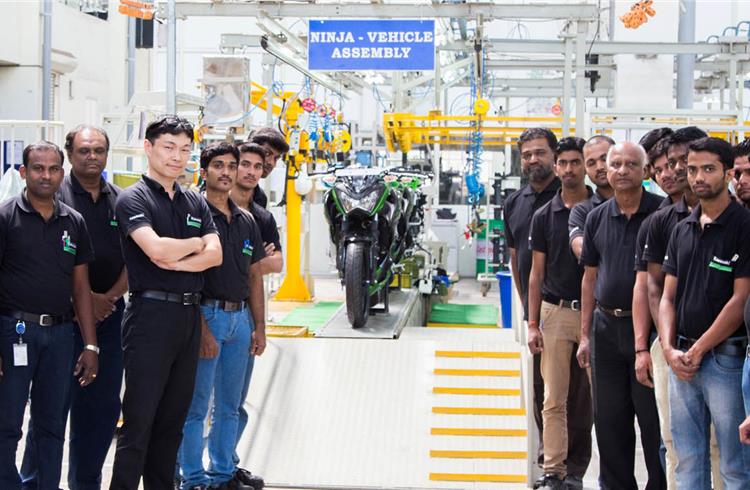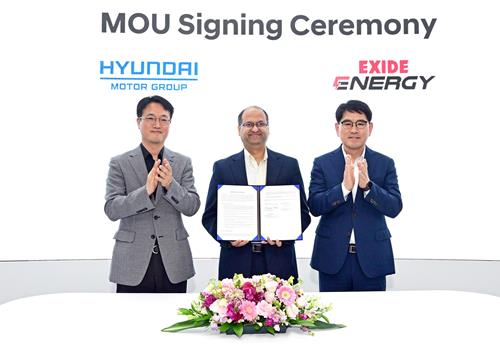Exclusive: India Kawasaki Motors building an all-new plant in Chakan
While setting up its own plant unit in Chakan will mark a big milestone in its India journey, aggressive operational expansion and restructuring of core teams is underway as Kawasaki gears up for its solo ride in the country.
India Kawasaki Motors (IKM) is planning to pull out its assembly operations from Bajaj Auto’s Akurdi factory in Pune and is learnt to be setting up its own unit in Chakan, several sources who are aware of the development have confirmed to Autocar Professional.
IKM, a 100 percent subsidiary of Kawasaki Heavy Industries Japan, is building its own motorcycle assembly plant in Chakan, scaling up its local operations, restructuring and expanding its teams and retail network as it prepares to go solo in India.
Bajaj Auto and India Kawasaki Motors ended their eight-year-old alliance with effect from April 1, 2017. The alliance between the two companies covered sales and aftersales services for Kawasaki motorcycles from Bajaj Auto-owned Probiking network (comprising over 300-plus showrooms) since 2009.
The Bajaj Probiking showrooms increasingly got converted into KTM dealerships after KTM’s entry into India via Duke 200 model in 2012.
India Kawasaki, on the other hand, has been looking to standardise and benchmark activities across several operations ranging from local assembly, parts procurement to retail and aftersales services.
Speaking on the condition of anonymity to Autocar Professional, a reliable source aware of the new developments said: “Kawasaki is very serious about its gameplan in India. All was not well between Kawasaki and Bajaj Auto for some time now. The company was apparently upset with the product cannibalisation between Kawasaki and KTM brands and customer overlap at the Bajaj Probiking showrooms. While the Kawasaki bike sales did not grow as per the expectations, sales of KTM motorcycles took off well.”
“Going forward, Kawasaki will have full control over their operations ranging from parts procurement and warehousing, quality checks to aftersales services to its customers. The Japanese management at IKM are diligently working to set up teams for all core responsibilities as they continue to expand their operations. They plan to move to their own plant now very soon,” the source added.
India Kawasaki Motors, which was officially established in July 2010, is learnt to be silently undergoing a critical transition during these months.
Kawasaki heads for make in India at Chakan
Although details of the new upcoming facility in Chakan, proposed investments, targeted annual production capacity and other critical areas remain unknown, the move is good news for the component supplier community located in the western region.
Largely, Kawasaki setting up its own standalone unit in Chakan will not only mark a big milestone for the company’s journey in India, it will also translate into a solid boost for the fast growing premium motorcycle market.
Autocar Professional estimates that IKM may shift into its all-new assembly plant and commence operations before the festive season approaches, if not for unforeseen delays and change of plans.
“We may have some news to share with you but we won’t talk about it now,” Yutaka Yamashita, managing director, IKM, who refused to comment on this development, recently told this publication.
The company’s annual production capacity at Bajaj Auto’s Akurdi-based assembly line is close to 10,000 units, understood to be on a double-shift basis. According to the senior company official, Kawasaki sold nearly 1,400 units in CY2016, which translates into almost-flat growth for IKM YoY.
“CY2016 was a challenging year for us as we are trying to improve our business. We are very positive for our future growth, we are expanding our operations, working on parts procurement and localisation step-by-step. Our highest priority is to take care of our customers. So we are working to increase our network, which we plan to grow by 30-40 percent this year. We have already launched six new models this year and more new motorcycle will come,” Yamashita had told Autocar Professional on the sidelines of the Z1000 / R models in Pune on April 23.
New models rolled out by the company this year include Z650, Z900, Z1000R and updated Ninja 300, Ninja 650, Z250 and Z1000.
Impact on the midsize motorcycle market
India Kawasaki is a formidable player in the growing midsize motorcycle segment, which is roughly understood as models with 250-800cc engines. The range is further defined in two sub-categories of 250cc to 500cc, which form the entry-level premium space, and the 500cc-800cc sub-category.
Royal Enfield, currently the leader in the midsized motorcycle segment, retails models in the 250cc-500cc sub-category.
The midsized motorcycle segment has been witnessing new entrants with more affordable models lately, thanks to the local manufacturing and CKD operations by various OEMs. Bajaj Auto can be credited for the growth of this premium category by giving it a substantial push through local manufacturing and retailing of KTM models in India.
Many other OEMs including India Yamaha Motor, Honda Motorcycle & Scooter India, Harley-Davidson Motor Company India, Triumph Motorcycle India and DSK Motowheels (via Benelli and Hyosung brands) followed suit by locally assembling their midsize bikes.
The midsize class is expected to further see new players stepping into this booming territory later this year including TVS Motor Company and BMW Motorrad, which will not only heat up the competition in the market, but will also bring new set of choices for the customers.
Kawasaki has had an early presence in India and has witnessed the building-up of the midsize motorcycle league. The company, which had first introduced its Ninja 250 at the Auto Expo 2008, is now aggressively driving its operations to match the right price points through localisation of its globally renowned models.
Although IKM officials have declined to comment on the development, company’s localisation plans for its 300cc and 650cc engines would directly impact the demand for its rivals that include Yamaha’s R3, Honda’s CBR650F, Triumph’s Street Triple among others.
Also read: India Kawasaki evaluates localising 300cc and 650cc engines
RELATED ARTICLES
IIT Bombay inaugurates Arun Firodia Research Floor
IIT Bombay, one of India’s top technical and research institutions, honours Kinetic Group chairman Dr Arun Firodia, one ...
Maruti Suzuki expands capacity at Manesar plant by additional 100,000 units
New assembly line at Plant A expands total manufacturing capacity at the Manesar plants to 900,000 units per annum. Alon...
Hyundai and Kia partner Exide Energy to produce LFP batteries in India
Partnership with Exide Energy enables Hyundai Motor and Kia to equip future EVs in the Indian market with locally produc...





 22 May 2017
22 May 2017
 46925 Views
46925 Views





 Autocar Pro News Desk
Autocar Pro News Desk




